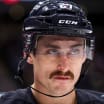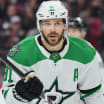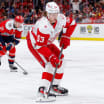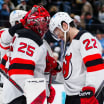Hockey Fights Cancer sparked by 'call to arms' 19 years ago
Joint initiative by NHL, NHLPA has raised $18 million, increased awareness
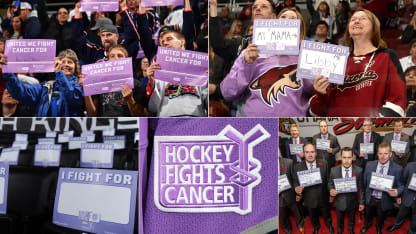
© Getty Images
Sitting beside him in the front row at the Ice Palace in Tampa were Maurice "Rocket" Richard and John Cullen.
Richard, a forward inducted into the Hockey Hall of Fame in 1961, scored 544 goals and won the Stanley Cup eight times during his 18 NHL seasons with the Montreal Canadiens. Cullen had a solid career as an NHL forward, getting 550 points (187 goals, 363 assists) in 621 games over 10 seasons with the Pittsburgh Penguins, Hartford Whalers, Toronto Maple Leafs and Tampa Bay Lightning.
RELATED: [Join the Fight! Hockey Fights Cancer]
Stewart was more of a fighter than a scorer as a rugged forward who bounced around the World Hockey Association, American Hockey League, North American Hockey League, Northeastern Hockey League, Central Hockey League and Atlantic Coast Hockey League. So he laughs now, as he did then, when he mentions the two goals he scored during his 21-game NHL stint with the Quebec Nordiques in 1979-80 before he moved on to become a referee and officiated more than 1,000 games in the League.
Yet he didn't feel like a third wheel joining forces with Richard and Cullen that day.
"Cancer was an equal opportunity aggressor," Stewart said.
Richard, Cullen and Stewart were the first faces of the NHL and NHL Players' Association's joint initiative, Hockey Fights Cancer, which was founded to raise money and awareness for national and local organizations involved in cancer care and research.
Richard's agent revealed in March 1998 that The Rocket was battling abdominal cancer. That was less than a month after Stewart was diagnosed with colon cancer. Cullen was diagnosed with non-Hodgkin lymphoma in March 1997.
Together with former Penguins center and Hockey Hall of Famer Mario Lemieux, who made a remarkable return from Hodgkin's disease, now known as Hodgkin lymphoma, to lead the NHL in points and win the Hart Trophy as League MVP in 1992-93, they were the inspiration for Hockey Fights Cancer.
Hockey Fights Cancer Awareness Month begins Wednesday.
"It started 19 years ago when John Cullen was recovering in Tampa and it was a call to arms," Commissioner Gary Bettman said. "It was a wake-up call. It was something that touched the family and got us all focused."

© Getty Images
The NHL and NHLPA each kicked in $50,000 to launch the campaign on Dec. 3, 1998, with the goal of raising $500,000 by the All-Star Game. With the help of the NHL teams, their players, the NHL Officials Association, the CBC and North American sponsor MBNA, Hockey Fights Cancer had raised more than $900,000 by the news conference in Tampa on Jan. 23, 1999.
Over the past 19 years, Hockey Fights Cancer has raised more than $18 million and been a vehicle for countless inspirational stories, including those of survivors such as Lemieux, Saku Koivu, Phil Kessel, Olli Maatta, Jason Blake and Nicholle Anderson, and the late Dave Strader, Pat Burns, Bryan Murray, Roger Neilson, Harley Hotchkiss and Ed Snider.
The latest to join the fight are former NHL forward and NBC Sports hockey analyst Eddie Olczyk, who announced Aug. 8 that he had been diagnosed with colon cancer, and New Jersey Devils center Brian Boyle, who announced Sept. 19 that he was diagnosed with chronic myeloid leukemia.
But it began with Richard, Cullen and Stewart.
Richard died on May 27, 2000, at age 78, leaving Cullen and Stewart to share their stories in the early years.
"When you're told you have the Big C your life changes right then," Cullen said.
\\*
More than 20 years after Cullen was diagnosed, the 53-year-old gets tested once a year at the Dana Farber Cancer Institute in Boston to make sure he remains free of cancer. Returning there makes what sometimes seems like a distant nightmare feel real again.
Cullen can't help thinking back to his near-death experience there when his heart stopped on his way into treatment and it had to be defibrillated back into rhythm.
"When I think of things like that, I kind of shake my head," he said. "Especially when I go there and I see people and they're not looking good and they're not feeling well, I just feel so lucky that I made it, and I made it through after my ordeal. Every time I'm there, I pray for all those people that they'll have the outcome I have."
At first, Cullen thought he had a bad chest cold or the flu. He was coughing and having a hard time breathing during games, but there was no way he was asking out of the lineup with the Lightning in a push to qualify the Stanley Cup Playoffs.
That was when his wife, Valerie, interceded.
When Cullen arrived at his locker room prior to a home game against the Hartford Whalers on March 27, 1997, he was stopped by Lightning athletic trainer Dennis Brogna, who asked, "What's wrong with you?"
"What are you talking about?" Cullen answered.
"Well, your wife called and she said something is wrong with you and you're not the same guy," Brogna said.
To Cullen, his wife had broken a code by calling the trainer, but he knows that she may have saved his life. After scoring a goal in the Lightning's 5-2 home loss to the Whalers that night, Cullen had a chest X-ray that revealed "a big black shadow."
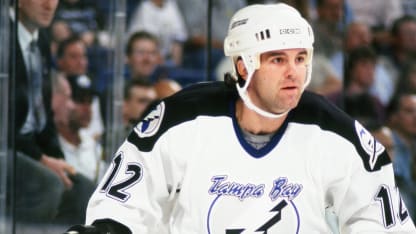
© Getty Images
A biopsy taken the next day revealed that Cullen had non-Hodgkin lymphoma.
Cullen, who was 32 at the time, missed the remainder of the season. He had six rounds of chemotherapy and 30 days of radiation with the hope of wiping out the cancer and returning to the Lightning in 1997-98.
After he completed his radiation treatments, he went for more tests at the Farber Institute. They showed that the grapefruit-sized tumor in his chest was gone but some smaller cancer cells remained.
"With lymphoma patients, it's a 90-95 percent cure rate when you first get it, but when [the initial treatment] doesn't eradicate the cancer that's when it goes down to 40, 30, 20 percent and some don't make it," Cullen said. "That's when they decided the best course of treatment to kill this whole freaking thing was to go through a bone marrow [transplant]."
Cullen maintained his playing weight through his chemotherapy and radiation treatments, but lost 35 pounds after the bone marrow transplant. Though he missed the entire 1997-98 season, he never gave up on returning to the NHL.
"That goal never left me," he said. "Then, as time went on and I started feeling better and feeling stronger and getting my weight back, that's when I started training and really gearing to get back on the ice."
Cullen returned to the Lightning for training camp before the 1998-99 season and earned a spot on their opening night roster but lasted four games before he was sent to their minor league team in Cleveland. He played six games there before deciding to accept the Lightning's offer to join the Tampa Bay coaching staff as an assistant.
"My body just wasn't the same," he said. "To play at that level, I was the type of player where I needed every ounce of strength I could muster."
That season, Cullen won the Masterton Trophy for perseverance, sportsmanship and dedication to hockey.
Terry Crisp, the Lightning coach when Cullen was diagnosed, said it was "a testament to his strength and character" that he made it back at all.
"When he was in the hospital it was touch-and-go and when he beat it and came back here it was one of the happiest moments in the history of our hockey club," Crisp said.
\\*
Without hesitation, Stewart can provide a lengthy list of those who died after being diagnosed with colon cancer. Those outside the hockey world include actresses Audrey Hepburn and Elizabeth Montgomery, Green Bay Packers coach Vince Lombardi, U.S. Olympian and pro golfer Babe Didrikson Zaharias and cartoonist Charles Schulz.
Victims from the NHL family include Burns, a Hockey Hall of Famer and Stanley Cup winner in 2003 as coach of the New Jersey Devils who died in 2010, and Murray, a former coach and general manager who died on Aug. 12. Stewart knew both well.
"All of those people could afford medical treatment, but we didn't know we were sick," Stewart said. "The real key to the success of people combatting this disease or any particular strain of it is that they need to get checked."
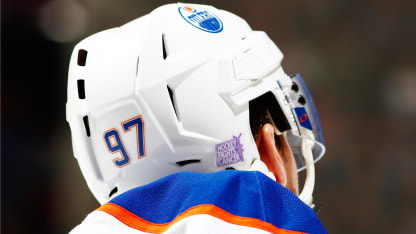
© Getty Images
Stewart, 64, gets checked every six months. He had his most recent colonoscopy two weeks ago.
Stewart had his first colonoscopy in February 1998 during the break in the NHL schedule for the Nagano Olympics. He was home watching the "Today" show with his wife, Lori, who was nine months pregnant with the couple's first child, and host Katie Couric was talking about how her husband, Jay Monahan, died of colon cancer.
When Couric mentioned some of the symptoms, Stewart realized he had several of them: bleeding, fatigue after going to the bathroom, stomach problems, weakness. At his wife's urging, he went to a doctor to get checked.
Stewart's son, McCauley, was born Feb. 22, 1998. The next morning, he was informed he had stage 3 colon cancer. He also had a second tumor in his liver.
"They told me I had six months to live when I got diagnosed and to go home and put my papers in order," Stewart said.
On June 10, 1998, Stewart had three hours of surgery to remove the cancer and 16 inches of intestine. That was followed by six months of chemotherapy.
Though the daily treatments made him ill, Stewart worked his way back into shape and returned to the NHL to referee a game between the Devils and Penguins in New Jersey on Nov. 13, 1998.
"I was given an awful lot of great gifts and a lot of talent and things that have carried me through -- persistence and lack of fear," Stewart said. "Yet, I've had to deal with death a few times."
In addition to being checked twice a year for colon cancer, Stewart also gets screened once a year for skin cancer after having it last year. In 2015, he had to leave his job as vice chairman of the Kontinental Hockey League's Officiating Evaluation Committee because of a brain tumor.
"After they removed it, [the doctor] said, 'Yeah, you had a good-sized golf ball,'" Stewart said. "I was fortunate that it wasn't malignant, but when you have had this disease every time you get a bump you tend to worry."
Stewart acknowledges that "the aspect of this enemy is always there" but tries to live without fear. He retired from refereeing in 2003, but remains active in the game as the director of officiating for ECAC men's and women's hockey. He's also busy with his two hockey-playing sons, McCauley, 19, and Maxwell, 16.
"There's a reason why I was saved," Stewart said. "I was meant to help others."
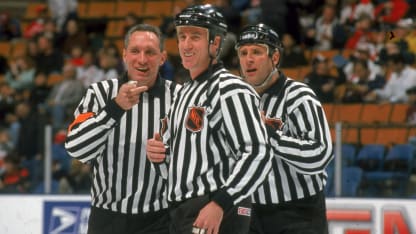
© B Bennett/Getty Images
\\*
Hockey Fights Cancer gave Stewart the opportunity to do that. While Stewart was preparing to return to refereeing in the fall of 1998, the NHL and NHLPA had already begun planning to launch the campaign.
What Stewart and Cullen went through that year made it clear how cancer had impacted so many in the hockey community. NHLPA director of marketing and community relations Devin Smith attended the first organizational meeting at the NHL's New York offices and remembers there being an instant commitment toward collaboration.
"Sadly, everyone has some sort of connection to cancer and we've seen it over time with a number of players," Smith said. "So to deliver the message of what we're doing with Hockey Fights Cancer and to talk to the players about it, they were all in right away on anything that we wanted to do. You heard stories about someone's aunt or grandmother or brother or sister. It touches everybody."
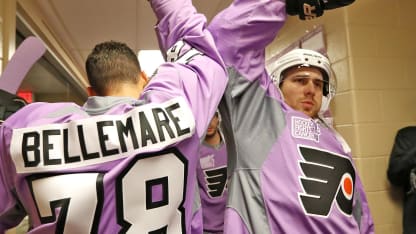
© Getty Images
Frank Supovitz, who was head of the NHL Events and Entertainment Department from 1992-2005, came up with the name during a conversation with Mary Pat Clarke, the League's director of communications at the time.
"She had been talking about how to create a community- relations and a cause-related campaign related to cancer and I recollect her and I sitting and talking about it and I said, 'That's an important fight and it should be called Hockey Fights Cancer,'" Supovitz said.
The role of fighting in hockey has long been debated, but the term fit the cause.
"Yes, it's a play on words and, yes, fighting in hockey was then and still is a topic of conversation, but that's what makes it so memorable," Supovitz said. "It's just Hockey Fights Cancer. It says everything you need it to be, which is it's an important struggle that the sport can get behind."
Commissioner Bettman lost his father, Howard, to leukemia at age 40, and his mother, Joy, died of brain cancer at 53. So he understands the importance of the initiative as well as anyone.
"It makes a difference in people's lives," Commissioner Bettman said. "It's about education. It's about raising funds. It's about supporting people who are struggling with cancer and their families. It's a dread disease and it affects directly members of the hockey family and to be supportive and let people know there are resources here to help them battle and to also make sure that people are getting the right medical checkups and care that they need are all important elements of it."
\\*
We're stronger together
In the early years, the NHL and NHLPA integrated Hockey Fights Cancer into events such as the All-Star Game. Funds were raised through various online auctions.
At the 2000 NHL All-Star Game in Toronto, the League partnered with Dodge to auction off a special-edition NHL Dodge Viper that went for $84,000, and Wayne Gretzky's final-game worn jersey raised $80,000. Stewart also spent a day sitting with the Stanley Cup and helping collect donations from fans.
More than $418,000 was raised during that All-Star Weekend.
"It never was a chore to have been included in the efforts," said Stewart, who joined with Couric to film a public service announcement about the importance of colonoscopies. "It was a great effort and it's great the NHL has sustained it."
In 2007-08, each NHL team began hosting a Hockey Fights Cancer Awareness Night during Hockey Fights Cancer Awareness Month, which bridged the final two weeks of October and first two weeks of November.
Hockey Fights Cancer Nights helps teams raise awareness about local charities and recognize some of those with the disease in their areas. Players wear special Hockey Fights Cancer decals on their helmets. Coaches, broadcasters and team employees around the League wear Hockey Fights Cancer pins and ties.
The first season, the decals and ties were pink, representing breast cancer, but they were changed to lavender after that to encompass all types of cancer. Since then, lavender has become synonymous with Hockey Fights Cancer.
During warmups at each team's Hockey Fights Cancer Awareness Night, players wear lavender jerseys and wrap their sticks in lavender tape, and some goalies wear lavender masks. The sticks, jerseys and masks are autographed by the players and auctioned to benefit Hockey Fights Cancer charities locally and nationally.
Lavender is also the color of the "I fight for" signs players, coaches, staff and fans utilize to pledge their support for someone in their lives who has been impacted by cancer. Fans can download the "I fight for" signs at hockeyfightscancer.com and post photos of them on social media using the hashtag #HockeyFightsCancer.
Initially, the American Cancer Society and the Canadian Cancer Society were the main beneficiaries of Hockey Fights Cancer's fundraising efforts. Over the years, several national and local charities have been integrated.
The Mario Lemieux Foundation in Pittsburgh is among the many important contributors to the fight on the local level. The Lemieux Foundation raises money for cancer research and patient care, as well as Austin's Playrooms, which creates playrooms for children and families in medical facilities.
The 2017 Pittsburgh Penguins 6.6K Run and Family Walk on Oct. 15 drew 6,200 participants and raised more than $235,000 for the Lemieux Foundation and the Pittsburgh Penguins Foundation. Since 1998, the Lemieux Foundation has donated more than $22 million to cancer research and patient care in and around the Pittsburgh region.
"As someone who battled cancer as an NHL player, I appreciate everything that Hockey Fights Cancer has done to raise awareness and support continued research efforts over the past 19 years," Lemieux, Pittsburgh's co-owner, said through the Penguins. "HFC has worked alongside the Mario Lemieux Foundation here in Pittsburgh and supports many such initiatives across the U.S and Canada. It means a lot to me and my family."
This season, Hockey Fights Cancer Awareness Month has been shifted to November. The American Cancer Society and the Canadian Cancer Society are involved again along with the Movember Foundation, a global charity focused on men's health issues, particularly prostate cancer, testicular cancer and mental health.
Since beginning in 2003, the Movember campaign, when men grow mustaches during November, has raised more than $850 million and funded more than 1,200 men's health projects across 21 countries.
The Movember movement came to the NHL in 2010 when then-Anaheim Ducks forward George Parros, now the head of NHL Department of Player Safety, decided to join. Since 2011, more than 4,000 people, including 1,119 NHL players, have participated Hockey Fights Cancer's Movember Challenge, and more than $800,000 has been raised by players, teams and fans.
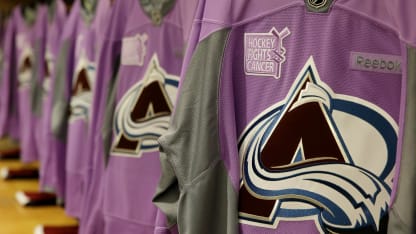
© Getty Images
"What I think is impressive with this program is we don't rest on what we've done," Smith said. "With the meetings we have now, we talk about how we're going to do more, how we're going to assess what we're doing, what can we do a little bit different/better so that we're not wasting energy in certain areas when we could be raising more money and awareness in others. So I think we're extremely pleased with where the program has gotten to and the future is good too because we keep assessing and trying figure out how we're going to make it bigger and better."
\\*
As someone who helped start Hockey Fights Cancer, Cullen said it's pretty amazing that the campaign has raised so much money.
Cullen hasn't been involved in hockey as much since he left the Lightning in 2000 to move with his family to the Atlanta area, where he manages his brother Terry's auto dealership. He's not on as big of a stage but he continues to try to help those who have been diagnosed with cancer.
"I've got a good friend of mine who just got diagnosed with prostate cancer and I've been talking to him extensively," Cullen said. "It's just you've got it, you've got to accept it and you've got to fight it, fight it like crazy. Stay positive and fight it."
Cullen remembers Lemieux expressing a similar message during their telephone conversations when Cullen was being treated for cancer two decades ago.
"He was just always positive and gave me great reassurance because he battled and he won," Cullen said.
Stewart is no longer on the front line for Hockey Fights Cancer either, but remains active with the National Colorectal Cancer Research Alliance and in advocating for others be tested. Because of his family history, his son, McCauley, will be tested after he turns 20 next year.
"Insurance companies play the odds and they say 50 [for the first colonoscopy], but I was 44 when I was diagnosed," Stewart said.
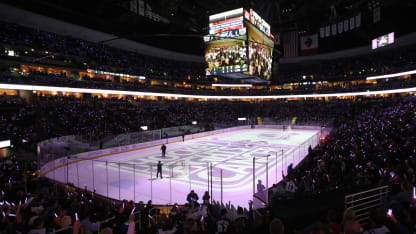
© Getty Images
Stewart points out that former baseball players Darryl Strawberry and Eric Davis also were diagnosed with colon cancer before well before they turned 50; Strawberry was 36 and Davis was 35.
Olczyk was a couple of weeks shy of his 51st birthday (Aug. 16) when he was diagnosed. Stewart thought about calling Olczyk immediately after he heard the news, but decided to give him some time and space because he probably was being inundated with calls and texts.
He ended up calling Olczyk a couple of days before he returned to NBCSN's booth on Oct. 18.
"I spoke to him about 20 minutes," Stewart said. "I told him that I appreciated what he was going through and if he needed any help to get ahold of me."
As someone who has gone through it, Stewart feels obligated to offer any help he can.
"Hockey guys help each other out," he said. "That's part of the reason why I'm glad Hockey Fights Cancer came along and raised all this money and this awareness because we need to help others."
To make a donation to Hockey Fights Cancer, visit hockeyfightscancer.com.


